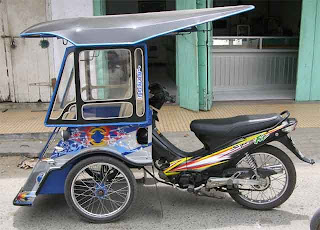 |
| Paddled Becak |
In 1942, when Indonesia was occupied by Japan, the uses of gasoline had been controlled by the Japanese Government and many Indonesia people were not allowed to own car. Because of that, the needs of Becak - as public transportation - was increasing and there has a very huge expansion of becak's quantity that time, especially in most of Java's big city, such as Jakarta, Bandung, Jogjakarta, Solo, Semarang, and Surabaya.
 |
| Becak with Machine (Becak Motor) |
In 1943, becak has been introduced to Makassar - one of the city in Sulawesi Island- and other city outside Java,such as Medan, Padang, Palembang,and Lampung.
Becak is ganing it high popularity in 1960s - 1980s, because it provides door-to-door service that easier passenger to go anywhere they want (especially if they bringing along a lot of their things).
In 1980's, becak becomes a very serious problem for Jakarta because of its extreme increasing. In 1950, becak only have 25,000 units that spreading in all over Indonesia. But in 1966, its quantity was blowing up hugely into 160,000 units in Jakarta only, and increase even much bigger - into more than 400,000 units in early 1980 - and become the main cause of the traffic jam. And this quantity was only noted in Jakarta only!!
In the same time, Indonesia government started to think that using of becak is considering as slavery and not fit with human rights. Due to this consideration, based on Regional Government Regulation (Peraturan Daerah) No. 11/ 1988, becak is restricted permanently as public transportation. Eventhough, the regulation is valid in Jakarta only. In other cities, becak still exist and treated as regular public transportation, until today.
THE TYPES OF BECAK
Each city has its own typical and types of becak. But generally, becak can be divided into two types :
a. Becak with back-controller (the driver is sitting at the back). It can be found in Java area.
b. Becak with side-controller (the driver is sitting at the side). Mostly used in Sumatera area.
 |
| Bemo |
Both types of becak can be divided into two sub-types :
1. Paddled becak.
2. Machine becak.
Paddled becak is using men power to paddle the becak. In most area in Java, all of the becak used paddle. Some people considered this kind of becak is similar as slavery act and critisized as a violation of human rights. Even that, this kind of becak still used in some Java city, like Bandung, Solo, Jogjakarta, Surabaya, Semarang, and also some city in Sumatera, such as Palembang.
Each city have its own trade mark of paddled becak. The seat of Java's becak usually a little bit higher to balancing the driver and the passenger's weight (especially for "heavy weight" passenger). Meanwhile Sumatera and Bandung's becak usually have lower seat to ease the passenger entering the becak.
Machine becak is becak that use machine to run. Usually the becak been attached to the motorcycle, either side-by-side or back-to-back.
 |
| Bentor |
1. BECAK MOTOR :
Literally it means "becak with motor". It is a becak that been attached with motor cycle side-by-side and its width is similar as regular car. It is a regular trasportation that been used in Medan and Pematang Siantar, North Sumatera.2. BEMO :
Actually Bemo is refering to "Becak motor". Differently with Becak Motor in Medan, Bemo is almost similar as car but use motor-cycle machine. Bemo is commonly found in Jakarta and become a trade-mark of Jakarta's traditional transportation. Bemo is created in 1962, and its purpose is to replacing Becak. Since it's abling to run faster and further comparing Becak, most people starting to like using Bemo.3. HELICAK :
 Another type of becak is Helicak, the combination words of "helicopter" and "becak", because its shape that similar with those transportation. Launched in March 24, 1971, helicak became one of the most famous transportation in Jakarta. Same as becak, the driver was sitting at the back, while the passenger at the front. The passenger cabin was made from steel and fiber glass. It made passenger safe from heat, rain, and dust. However, because of the inconsistency regulation from local government, soon helicak did not developed well and dissapear by the end of 1970's era.
Another type of becak is Helicak, the combination words of "helicopter" and "becak", because its shape that similar with those transportation. Launched in March 24, 1971, helicak became one of the most famous transportation in Jakarta. Same as becak, the driver was sitting at the back, while the passenger at the front. The passenger cabin was made from steel and fiber glass. It made passenger safe from heat, rain, and dust. However, because of the inconsistency regulation from local government, soon helicak did not developed well and dissapear by the end of 1970's era.4. BENTOR :
Refer to "Becak Motor", it is a trade-mark transportation from Gorontalo, South Sulawesi. This is becak with motor-cycle back-to-back position and can run very fast. Althought Bentor is very popular, the existance of this transportation is not permitted.5. BECAK RENGAT :
Becak Rengat (or simply called "Becak") is one of becak type that very popular in Rengat, Riau Island. It is paddle-becak in which the position of the driver is at the side of the becak, not in the back as other becak. |
| Becak Rengat |
No comments:
Post a Comment